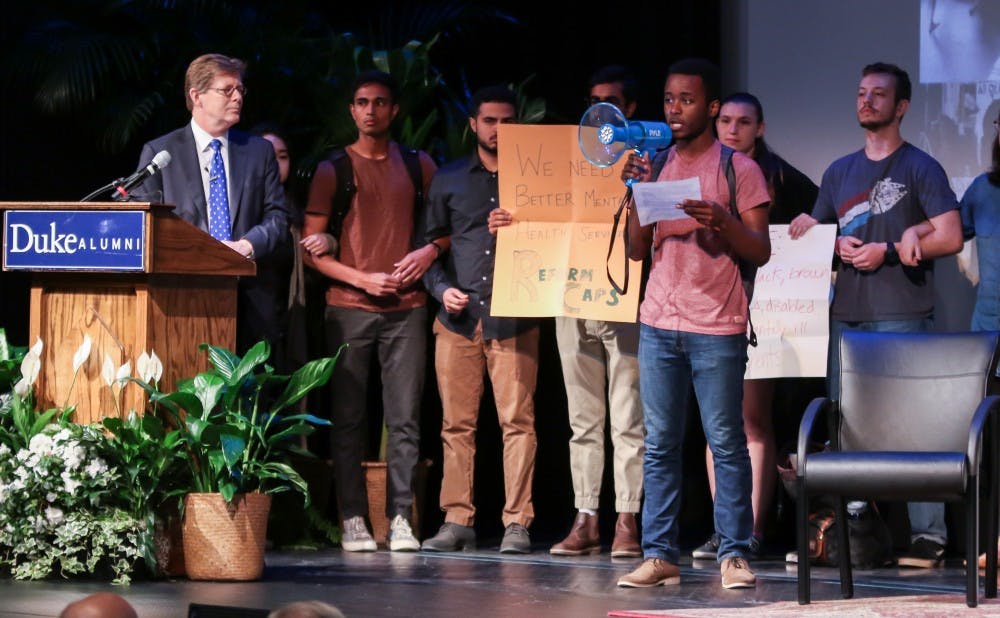This past April, a group of students calling themselves People’s State of the University walked onto the stage as President Vincent Price’s stood at the podium and issued a dozen demands.
Eight months later, the group has checked off multiple demands and continues to go to the table with administrators.
PSOTU began its on-campus career in the public eye with its demonstration during Price’s address to a Page Auditorium filled with alumni there for reunions.
Since then, the group has had several of its demands met.
Duke University and Duke University Health System announced Sept. 25 that they would no longer ask individuals whether they have been convicted of a felony during the initial stage of applying for employment, becoming one of several institutions following a national “ban the box” trend. “Ban the box” was one of PSOTU’s original demands.
“I think it’s been surprising, the degree to which [administration] has been wanting to work with us in a genuine way,” said junior Gino Nuzzolillo, a PSOTU organizer, who attributed the "ban the box" change to the administration’s efforts and understanding.
When the announcement was first made, Kyle Cavanaugh, vice president for administration, noted that the administration had met with two subgroups of students as part of the decision-making process and that it something administrators had been working on for a while.
"This has been something under discussion and review for some time," he wrote in an email to The Chronicle at the time.
Another demand the group made was for open Board of Trustees meetings. In the Fall semester, the Board rolled out new transparency initiatives.
Aside from meeting with administrators, the group has also continued in its protest roots. In the Fall semester, it organized a rally to push for the renaming of the Carr Building, which the History Department faculty had filed a formal request to rename.
Nuzzolillo said that PSOTU’s success in getting to the table with University officials has emerged on the foundation of years of effort by other student activists. In particular, he noted the Asian American Studies Working Group, which he said has been “pushing since 2002” for an official Asian American Studies program, which was established in May 2018.
“At this point we can work with administration the way we are because there have been such long pushes by other student activists," Nuzzolillo said.
PSOTU’s present negotiating power was not a foregone conclusion when the students rushed the stage during Price’s speech. At first, many protesters faced potential disciplinary action.
Richard Riddell, secretary to the Board of Trustees, explained the role of the working group some PSOTU members are involved in—the Working Group for Community and Dialogue—in facilitating those conversations and making them productive. The group also has faculty, administrators and other students—including the presidents of Duke Student Government and the Graduate and Professional Student Council—on it, Riddell told The Chronicle in September.
"We were looking for ways to have dialogue on the issues people care about... The working group has no authority to take any action," Riddell said. "But it has some convening power, and monitor the monitor [discussions] and make sure they proceed."
One of the issues the group discussed at the end of the summer was related to "ban the box." Riddell further noted the role of PSOTU and the Working Group for Community and Dialogue as a response unit.
"We did that once already this year with the Mary Lou Williams Center defacing...It's the first time we've had a ready-to-go group of students, administrators and faculty," Riddell said in September.
There is one barrier to lasting student activism that cannot be avoided—the passage of time. But Nuzzolillo said that the high number of younger students gaining a foothold in PSOTU may help preserve the group.
“There is really strong desire to pour energy into transferring knowledge, skills, institutional memory into younger students to create the space so first-years and sophomores can take leadership roles and start to become comfortable in that role as a student activist,” he said. “We need to pass on the things older student activists learn to younger students—hopefully that creates a structure that makes this movement sustainable.”
Riddell noted the educational factor of dialogue with student groups like PSOTU.
"I'm sure we won't be able to do everything that any student group would like us to do," Riddell said. "But if there is dialogue about whatever the concern is, there is a good chance that education will happen—students will learn and the administration will learn things and see what we might do to improve a situation."
Get The Chronicle straight to your inbox
Signup for our weekly newsletter. Cancel at any time.

